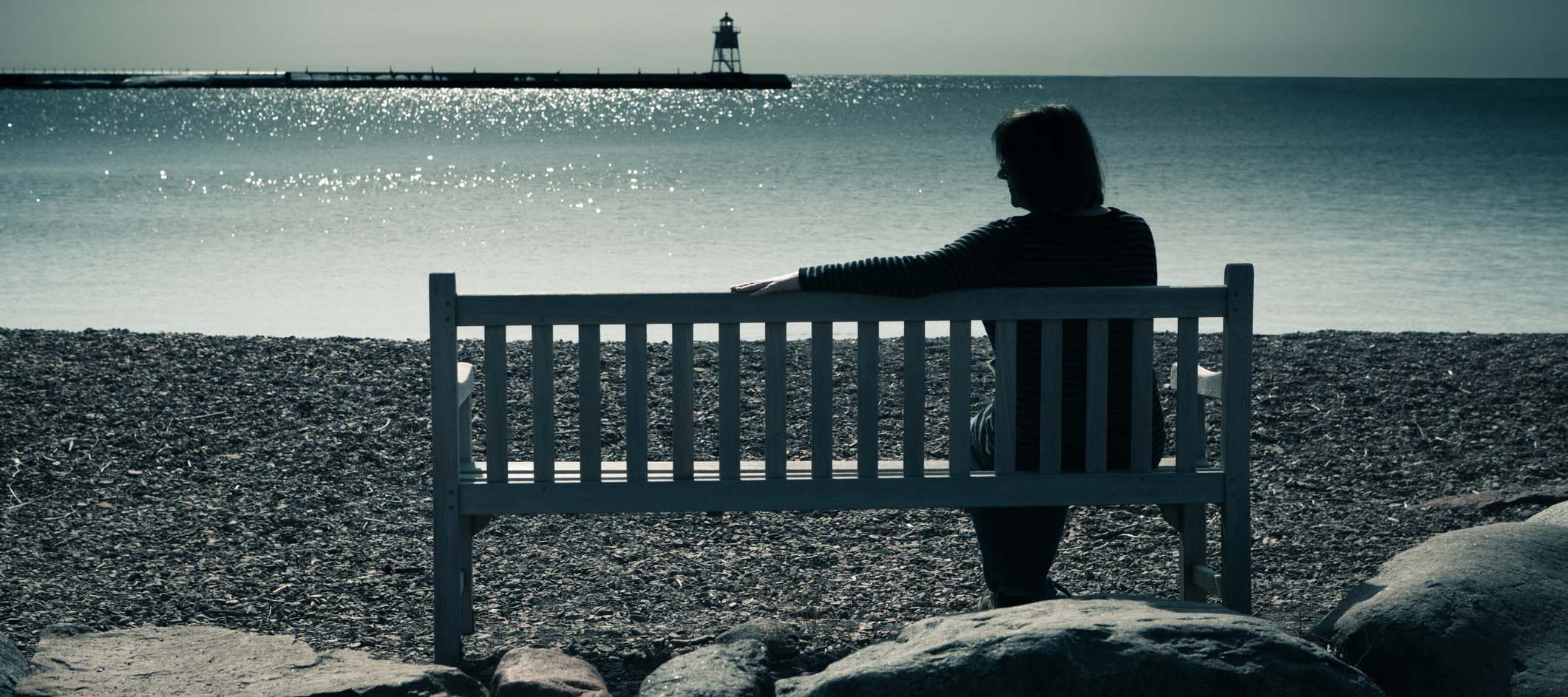
Woman in silhouette, sitting on a bench in a moody landscape at water's edge. The lone woman may be widowed, divorced, or lonely, sitting in solitude, contemplating her grief, sadness, or depression. The lighthouse in the distance is a symbol of finding hope or direction in a sea of troubles.
In the grip of dementia, the mind is often lost at sea
You sit in the chair by the window looking at the ocean. There is a mist out at sea, making it impossible to tell where the sky meets the water. You turn whenever anyone enters the room and smile. Blue eyes, sky blue once, now dulled by a film of liquid that escapes down your cheeks, over eyelids that have lost their firmness, causing them to turn outwards, exposing red rims reminiscent of late nights and good company. You are not aware of the red rims or the false tears.
On your navy jumper there are bits of food; crumbs from
breakfast mixed with gravy stains from last night’s dinner. You do not brush
them away. Silver hairs that yesterday adorned your crown now perch
precariously on your shoulders. The blanket on your lap slips a little. You let
it be until a woman in a light blue uniform and soft white sensible shoes comes
and straightens it again, not appearing to notice the crumbs or the gravy
stains.
“The barber is coming today, Tom,” she says, a little
louder than one would expect from someone standing so close that her face
almost touches yours. She is searching for your eyes, your ears, some sign that
you have understood. You smile and go back to looking at the sea.
You inhabit an underwater world, where only you can
breathe. Your ears are filled with underwater sounds. Your eyes no longer make
out the straight lines and edges of the world. People are shapes floating in
and out of focus. Sometimes when they come close, you try to draw them to you
but they move away, oblivious to your efforts. Waves of familiar sights and
sounds sometimes come to you while you sleep and for a brief time, you are who
you once were, before you started to sink.
You never ask for food, or a drink, or to go to the
bathroom. You seem content to let others do to you what they will. Sometimes
you doze in your chair, your head falling forward, your breath making no sound,
but you never complain of being tired or ask to be put to bed. Your legs no
longer bring you where you want to go. Legs are of very little use in this
underwater world.
Something is buzzing. A sound that you don’t recognise but
that seems familiar all the same. Not anything to be frightened of. Perhaps it
is one of those vehicles that you used to travel in. Or is it that thing you
used to use to cut the branches of the trees in your back garden. You seem to
remember you did that once and also the lower rows of plants that grew around
the side of the house. ‘Hedges’ — that was what they were called. Yes, there
would be buzzing when you cut the hedges. And after cutting hedges, you got on
that travelling machine — a train. So, the buzzing is the train, in your head. Not
that it matters anymore. But it is good to make sense some of the time.
Someone is talking to you. “Will we go for a walk by the
sea?” she is saying. She holds something in her hand that she puts on your
head. You let her. You smile. “Great,” she says, “we will go so,” and she
straightens your blanket and zips up the jacket she has already pushed your
arms into.
You smile again as you leave the waiting room and someone
says that you love going for your walks and how your daughter loves to bring
you. You expect the train will be here any minute now. The train that takes you
to the sea, after the buzzing and the cutting of the hedges.
A breeze stirs your blanket, brushes past your cheeks,
your ears, in and around that thing she put on your head. She is talking. The
promenade is not so busy and the train has just pulled in, she says. Something
lands on your lap. Orange and black. Twitching, quivering. It came from the
hedge that you were cutting. You try to touch it but it flies away.
A sharp, shrill
noise disturbs you. You look up, scared. “It’s just the train,” she says.
People come towards you with bags, walking briskly, past your chair, stepping
aside for you, not looking down, seeing but not seeing. You want to ask them to
stop a while and tell you where they have been. But you cannot find the words.
Your head drops onto your chest. Your eyes close. Too much thinking. Too much
trying to make sense. You are oblivious to the breeze and the people and your
daughter pushing you steadily, talking, and to the bee that has settled on your
lap and to the sea. You have gone under again. Everything is easier there.





Leave a Reply
You must be logged in to post a comment.